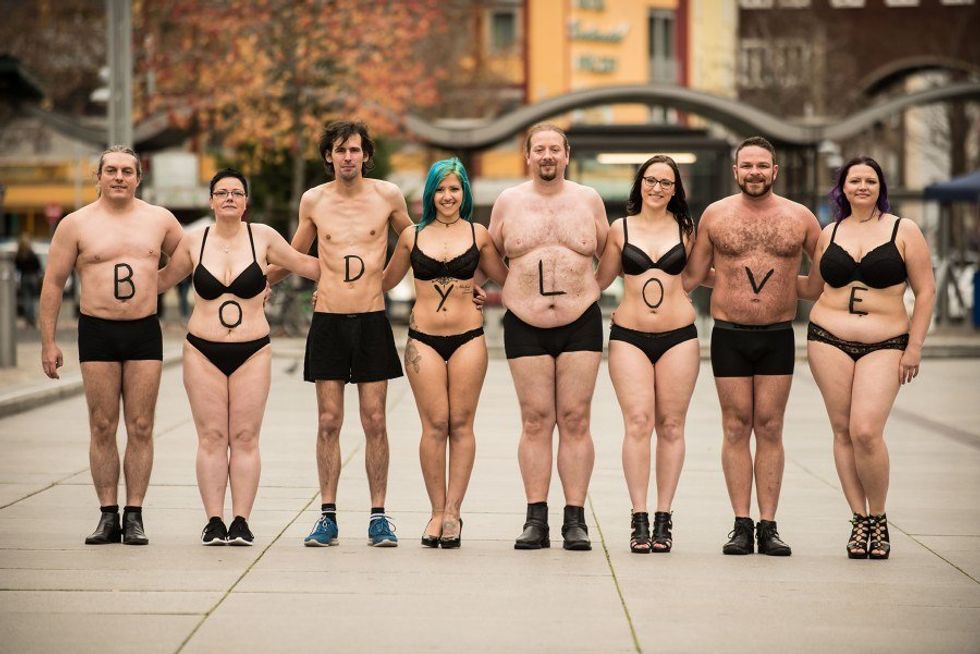The past few years have seen a huge increase in the number of people fighting against traditional standards of beauty with messages of self-love and self-acceptance. Individuals across the world have taken to social media to spread awareness about the importance of maintaining a healthy mental and physical relationship with one's body, and many celebrities have utilized their power and influence to fuel the fire of the body positive movement.
Personally, I think it's fantastic to see so many people supporting this cause. It's about time that people realize that thigh gaps and toned abs are not the end-all-be-all as far as looking and feeling beautiful.
Critics of body positivity claim that it promotes an unhealthy lifestyle and encourages obesity, but it's impossible to determine whether someone is healthy or not by simply looking at them. Health is a medical issue that exists only between an individual and their doctor.
Besides, even if someone is at a medically unhealthy weight (whether they're overweight or underweight), that's still not an excuse to shame them. Their bodies, although not in the best of health, are still what they are. Making someone ashamed to exist in their own skin doesn't solve anything. In fact, more times than not, it makes things worse. Sure, it's probably in that individual's best interest to make lifestyle changes so that they can live a long and happy life. But that's their business; not anybody else's.
Body positivity isn't about being unhealthy.
I dare you to find a single body positive campaign out there that says “Eat junk food every day. Drink lots of alcohol and sugary beverages. Cut all fruits and vegetables out of your diet. Avoid exercise at all costs.” That would be promoting an unhealthy lifestyle. I can guarantee you that you will not find a single body positive campaign in the world that says anything remotely close to that, because body positivity isn’t about encouraging people to be unhealthy.
It's about encouraging women to love themselves exactly how they are, in a society that's hypercritical of women's bodies. It's about teaching women to have greater aspirations in life than tailoring their physical appearance to fit someone else's standards. It's about telling women that there is no shame in having scars, stretch marks, cellulite, large thighs or slim thighs, wide hips or narrow hips, a large bust or small bust, or anything in-between. It's about giving a much-needed wake-up call to the people who think they have the right to tell women how their bodies should look, how women should feel about their bodies, and what they can and can't do with their bodies. It’s about reminding women that the only person who needs to approve of their body is themselves.
You may think that body positivity promotes an unhealthy lifestyle, but so does telling women that the only way they can be beautiful is if they attain body proportions that only 5 percent of American women possess naturally. You can say that body positivity promotes unhealthy eating habits, but so do eating disorders.
Plus-size fashion isn't revolutionary.
I've never understood why we have the label “plus-size” in fashion. I know that it's meant to differentiate larger body sizes from smaller body sizes, but why do we need to differentiate them in the first place? A body is a body no matter what shape or size, and it's ridiculous to treat larger body sizes as if they need their own separate category. If we're going to have the term “plus-size” for larger than average sizes, why not have the term “minus-size” for smaller than average sizes? It sounds crazy, doesn't it? We don't think of thinner people as being different or out of the ordinary, so why do we think of larger people in that way?
I completely support the recent rise of plus-size fashion, in the sense that it shows that an increasing number of designers and apparel companies are starting to include more variety in the sizes of clothing that they produce. I just take issue with the fact that larger clothing has to be labeled "plus-size", as if it's a completely different entity than smaller clothing. In the end, it's all just fabric.
Another issue that I have with plus-size fashion is how we define it. Plus-size is defined as being “of a size larger than the normal range”, but there's no such thing as a “normal” body. Sure, there's a generally accepted range of height and weight measurements that constitute healthy and unhealthy (although even that's subject to debate), but the idea of a “normal” body is ridiculous.
Plus-size fashion generally starts at around size 14 or 16 – which, by the very definition of the term "plus-size", would constitute anything size 14 and up as “abnormal” – and yet the average American woman wears a size 14. We’re glorifying a small proportion of the population and telling the majority that they need to be like them, instead of recognizing that all bodies (whether they're small, big, or in-between) are perfectly fine just the way they are and don't need to change.
Men have bodies too.
Issues surrounding male body image hardly ever make headlines, and that's because we’re not as critical of men's bodies as we are of women's. Our society is better at focusing more on the non-physical qualities of a person (like intelligence and personality) in men than in women.
However, in an image-driven society like ours, nobody is free from the pressure to look a certain way. There definitely is a lack of diversity in the types of male bodies that we see in the media.
Aerie, a branch of the clothing company American Eagle, launched a body positive campaign for men in early 2016, called Aerie Man, with the slogan “The real you is sexy.” Much to my (and many others’) dismay, the whole campaign turned out to be a joke. The company publicly stated that it was all a hoax designed to raise awareness about male body image. I personally don't understand why they would use all that time and money just to make a fake campaign when they could've used all of those resources to make a real campaign, but that's not the main issue here. The issue is that body positivity should encompass everyone, regardless of gender or sexuality.
We are more than just bodies.
I think one of the most overlooked and yet extremely important lessons of the body positive movement is that, as much as we need to love and appreciate our bodies for what they are, we are more than just bodies.
There's so much negativity in the world – negativity directed at others as well as negativity directed at ourselves – regarding physical appearance. We need to realize that what you see on the outside is only part of a whole person. We, as human beings, have personalities, skills, unique minds, feelings, and so many other beautiful qualities that have nothing to do with physical appearance.



















